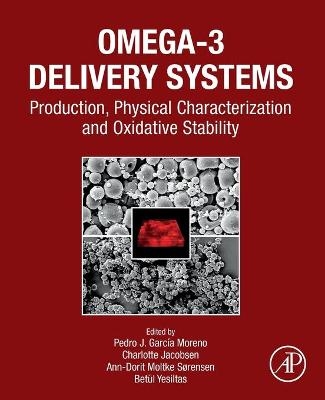
Omega-3 Delivery Systems
Academic Press Inc (Verlag)
978-0-12-821391-9 (ISBN)
Long chain omega-3 polyunsaturated fatty acids (PUFA) present numerous health benefits; however, the consumption of natural products rich in omega-3 PUFA (e.g., fish, krill, and algae) is not enough to reach the daily-recommended values. Therefore, the food industry is highly interested in producing omega-3 fortified foods.
Pedro J. García-Moreno, PhD, is an Assistant Professor at the Department of Chemical Engineering at the University of Granada (Spain). He obtained his PhD in 2013 at the University of Granada and worked from 2015 to 2019 as Marie Curie postdoc and scientist at the National Food Institute, Technical University of Denmark. His research focuses on the development of novel strategies to prevent oxidation of omega-3-enriched foods including emulsification, nanomicroencapsulation, and use of novel emulsifiers/antioxidants. He has received several awards including the Young Lipid Scientist’s Award by the European Federation for the Science and Technology of Lipids, the Outstanding Young Researcher Award by the European Section of the American Oil Chemist’s society (AOCS), and the PhD Thesis award by the Spanish National Association of Chemists and Chemical Engineers (ANQUE). Since 2018 he serves as Associate Editor of the Journal of American Oil Chemists’ Society (JAOCS). He has published 60 scientific publications including peer-reviewed scientific articles and book chapters. Charlotte Jacobsen, PhD, is a Professor in BioactivesdAnalysis and Application. She leads the Research group for BioactivesdAnalysis and Applications at the National Food Institute, Technical University of Denmark. She is internationally renowned for her research in lipid oxidation of omega-3-enriched foods, and she has received several awards including the Danish Danisco price 2003 (40.000 $), the French La Médaille Chevreul 2010 awarded by Association Francaise pour l’étude des Corps Gras, the Norman medal from Deutsche Gesellschaft f€ur Fettwissenschaft e.V. (2020), the Stephen S. Chang award (2021), and two best paper awards from the American Oil Chemist’s Society. She was appointed by EFSA as an expert in the Fish Oil Working Group under the Biohazard Panel to evaluate the potential hazard associated with human intake of refined fish oil. Her publication list includes more than 230 peer-reviewed manuscripts and book chapters. Ann-Dorit Moltke Sørensen, PhD, is a Senior Researcher in the Research group for Bioactives-Analysis and Application at the National Food Institute, Technical University of Denmark. She obtained her PhD in 2010 from the Technical University of Denmark. Her research focuses on the area of lipid oxidation in foods, antioxidants, and their efficacy in emulsified systems. She has received a Young Scientist award by the Nordic Lipid Forum and a European Student Travel award by the EAOCS board. Moreover, she received the Edwin Frankel Best Paper award in 2012 in lipid oxidation and quality. Her publication list includes 40 peer-reviewed manuscripts and book chapters. Betül Yesiltas, PhD, is a Researcher on tenure track working as part of the Bioactives group at the National Food Institute, in the Technical University of Denmark. Since completing her PhD on the physical and oxidative stability of highfat omega-3 delivery oil-in-water emulsions in 2019. She has mainly been working in the area of food structure and lipid oxidation. She is expanding her knowledge on the use of small-angle X-ray and neutron scattering techniques in complex food emulsions, which has high potential to elucidate oil-water interfacial structure. Before her academic career started, she had worked in Research & Development departments of some of the world’s leading companies such as Danone and Unilever. Betül's research interests include, but are not limited to, antioxidants, emulsifiers, oil-water interfacial structure, physical and oxidative stability of fish oil-in-water emulsions, lipid oxidation in foods or model food systems, and bioavailability of bioactive compounds.
I Background 1. Traditional and novel sources of long-chain omega-3 fatty acids 2. Health benefits of omega-3 fatty acids 3. Extraction, refining, concentration, and stabilization of long-chain omega-3 oils 4. Global market for the long-chain omega-3 fatty acids EPA and DHA and their regulation 5. Introduction to delivery systems and stability issues
II Physical characterization 6. Traditional methods to physically characterize delivery systems 7. Electron microscopy and its application to the characterization of omega-3 delivery systems 8. Small-angle scattering in studies of long-chain omega-3 delivery systems
III Measurement of oxidative stability 9. Lipid oxidation and traditional methods for evaluation 10. Lipid oxidation studied by electron paramagnetic resonance (EPR) 11. Spatiotemporal studies of lipid oxidation by optical microscopy
IV Delivery systems e production, physical and oxidative stabilities 12. Low-fat (<50%) oil-in-water emulsions 13. High fat (>50%) oil-in-water emulsions as omega-3 delivery systems 14. Lipid oxidation in pickering emulsions 15. Nanoemulsion design for the delivery of omega-3 fatty acids: formation, oxidative stability, and digestibility 16. Spray-dried capsules and extrudates as omega-3 lipids delivery systems 17. Omega-3 nano-microencapsulates produced by electrohydrodynamic processing
V Food enrichment, digestion and bioavailability 18. Solid lipid nanoparticles and nanostructured lipid carriers 19. Food enrichment with omega-3 polyunsaturated fatty acids 20. Aspects of food structure in digestion andbioavailability of LCn-3PUFA-rich lipids 21. Oxidative stability during digestion
| Erscheinungsdatum | 02.08.2021 |
|---|---|
| Verlagsort | San Diego |
| Sprache | englisch |
| Maße | 191 x 235 mm |
| Gewicht | 1020 g |
| Themenwelt | Technik ► Lebensmitteltechnologie |
| ISBN-10 | 0-12-821391-4 / 0128213914 |
| ISBN-13 | 978-0-12-821391-9 / 9780128213919 |
| Zustand | Neuware |
| Haben Sie eine Frage zum Produkt? |
aus dem Bereich


